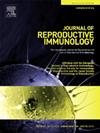Intravenous immunoglobulin (IVIg) use in recurrent implantation failure: Is it time for another randomized controlled trial?
IF 2.9
3区 医学
Q3 IMMUNOLOGY
引用次数: 0
Abstract
Recurrent implantation failure (RIF) affects up to 5 % of patients undergoing in-vitro fertilization (IVF) yet remains unexplained in over 50 % of cases. Perturbation of the permissive immune environment required for implantation is thought to explain a proportion of RIF cases but remains a diagnosis of exclusion due to the lack of validated testing to confirm the condition. Patients are often empirically treated with immunomodulatory medications, with intravenous immunoglobulin (IVIg) being prominently featured. While some suggest potential benefit, available studies are heterogenous, often underpowered and do not consider recent definitions of RIF; IVIg remains a heavily debated IVF adjunct. With the recent COVID pandemic-induced global blood product shortage, IVIg prescribing practices for RIF must be reviewed. A well designed, adequately powered randomized controlled trial (RCT) is needed to determine if IVIg should be featured in our armamentarium. However, prior to its design, data amassed over the last 3 decades must be incorporated to ensure it yields robust and clinically meaningful data. This narrative review synthesizes our current state of knowledge on the topic, discussing proposed mechanisms of immune-mediated RIF, potential mechanisms of action of IVIg as well as patient populations most likely to benefit from immune-modulation. Lastly, with use and prices of IVIg rising globally, we discuss our collective responsibility towards ensuring IVIg stewardship while proposing timely and cost-effective interventions for our patients.
静脉注射免疫球蛋白(IVIg)用于复发性植入失败:是否需要进行另一项随机对照试验?
复发性植入失败(RIF)影响高达5 %的接受体外受精(IVF)的患者,但在超过50% %的病例中仍然无法解释。植入所需的允许免疫环境的扰动被认为可以解释一部分RIF病例,但由于缺乏有效的检测来确认这种情况,因此仍然是一种排除诊断。患者通常经验性地使用免疫调节药物治疗,静脉注射免疫球蛋白(IVIg)是显著的特征。虽然有些人提出潜在的好处,但现有的研究是异质的,往往缺乏动力,并且没有考虑到RIF的最新定义;IVIg仍然是一个备受争议的IVF辅助手段。由于最近COVID大流行导致全球血液制品短缺,必须审查IVIg对RIF的处方做法。我们需要一项设计良好、足够有力的随机对照试验(RCT)来确定IVIg是否应该在我们的医疗设备中使用。然而,在其设计之前,必须结合过去30年积累的数据,以确保其产生可靠且有临床意义的数据。这篇叙述性综述综合了我们目前对这一主题的了解,讨论了免疫介导的RIF的潜在机制,IVIg的潜在作用机制以及最有可能从免疫调节中受益的患者群体。最后,随着IVIg的使用和价格在全球范围内的上涨,我们讨论了确保IVIg管理的集体责任,同时为我们的患者提出及时和具有成本效益的干预措施。
本文章由计算机程序翻译,如有差异,请以英文原文为准。
求助全文
约1分钟内获得全文
求助全文
来源期刊
CiteScore
6.30
自引率
5.90%
发文量
162
审稿时长
10.6 weeks
期刊介绍:
Affiliated with the European Society of Reproductive Immunology and with the International Society for Immunology of Reproduction
The aim of the Journal of Reproductive Immunology is to provide the critical forum for the dissemination of results from high quality research in all aspects of experimental, animal and clinical reproductive immunobiology.
This encompasses normal and pathological processes of:
* Male and Female Reproductive Tracts
* Gametogenesis and Embryogenesis
* Implantation and Placental Development
* Gestation and Parturition
* Mammary Gland and Lactation.

 求助内容:
求助内容: 应助结果提醒方式:
应助结果提醒方式:


